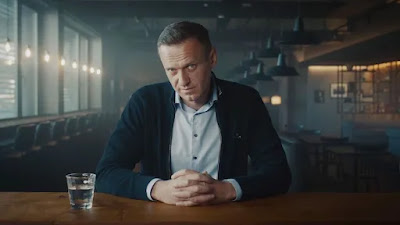While Team Navalny await their man's full recovery, Roher lays out the essentials of this career with a brisk clarity: Navalny's passing flirtation with the far right (dutifully followed up in interview, coherently answered to as coalition-building pragmatism); his emergence as a serious alternative to the Putin regime; his playful, youth-courting social-media presence. Running parallel to this, we're introduced to the Bellingcat journo Christo Grozev, a Bulgarian based in Vienna, who spotted that the investigation into Navalny's poisoning was likely to fall between two stools - the Russian authorities unlikely to investigate, the Germans unable to investigate - and personally stepped into the breach, sourcing data online at an expense he admits is vast enough to have been withheld from his wife. As an interviewer, Roher seeks complete candour, encouraging his subjects to confess any suspicions and misgivings they may have had about one another; he even works in B-roll footage of the just-rehabilitated Navalny conferring with his assistant as to how he's coming across in the main interview. ("Angry eyes," she cautions. You can't exactly blame him.) We quickly grasp that a case is being made on two fronts: an investigative one against those individuals responsible for Navalny's poisoning, and an ideological one in favour of exactly the kind of openness and truthtelling President Putin would prefer to have shut down.
How is Navalny? The phrase lawyer-turned-opposition-leader might conjure a stoutly Starmerite picture for UK viewers, but Roher's subject proves surprisingly larky and sparky: a man with the gift of getting those around him to relax, even at moments of high tension, in a way that instinctively feels oppositional. (He has no gulags to send anybody to, and gives no indication that he would if he did; I suspect the lawyer in him would still rather see Putin put on trial than cast into the void.) As demonstrated by the Simpsonian cadence of one imagined call to the Kremlin ("Hi, this is Navalny - you may remember me from Trying To Kill Me"), his defining characteristic, both in interview and on the move, is a bullish sense of humour - a sense of a life beyond the desk that you just don't get from his political opponent. (You certainly can't imagine Putin lipsynching to OMC's "How Bizarre" in a TikTok video, as Navalny does here.) The centrepiece is a terrific sequence - documentary gold, as Roher surely realised - in which Navalny, with Grozev's assistance, calls up his suspected poisoners, either to confirm their participation or simply to ask what they have against him personally; it's a prank at heart - the prankers' delight when it pays off confirms as much - but one with extraordinary, foundation-shaking ramifications. Here, as elsewhere in Navalny, Roher seems to be offering a record of how one might expose and fight tyranny, and it's one that will only increase in value as more dark money sloshes through the financial sewers of London and out into the wider world. The message Navalny gives his supporters as he finally touches back down in Moscow - "I urge you not to be afraid" - is but the start of this resistance; it chimes with an anecdote he tells earlier in the film about the Russian intelligence top brass who, having had "moscow1" and "moscow2" hacked, reset his security-clearance password to "moscow3". Roher's film is also making a vital third case, one that establishes beyond a reasonable doubt that Putin is not at all the mastermind he wants us to believe he is - a finding since firmed up by his army's dismal showing upon arrival in Ukraine. They should airdrop Roher's film into Kyiv and Lyiv - and, indeed, into Moscow and St. Petersburg.
Navalny is now showing in selected cinemas, available to rent via Prime Video, Curzon Home Cinema and Dogwoof on Demand, and available to stream via the BBC iPlayer.

No comments:
Post a Comment